Khruangbin, from left to right: guitarist Mark Speer, bassist Laura Lee Ochoa, and drummer Donald “DJ” Johnson Jr.
On the eclectic instrumental band’s newest, A LA SALA, the bassist pledges to “just play what sounds good and what feels good.”
“Bass playing is like humming to me,” says Khruangbin’s Laura Lee Ochoa. “I hum to myself all the time. It’s very in-your-body. It’s also one note, it can be as melodic as I want it to be, and it’s simple. It was something that just resonated with me.”
Ochoa is describing the epiphany that brought her to the bass back in 2009, when she was working as a third-grade math teacher. First learning piano with help from her pal, guitarist Mark Speer, she recalls, “I was trying to play along to a song and he said to follow the bass. Then I picked one up, and it weirdly made sense to me.” It was a monumental event—the catalyst for just about everything that followed.
Soon, Ochoa quit her teaching job to go on tour with Speer in the shoegaze band Yppah. “It was five people staying in a Motel 6 every night, flipping a quarter for who slept on a bed,” she remembers. “We were in a minivan, I had no amp, I was playing direct every night—it was that kind of tour. Our very last show was in Seattle, and we drove to Houston in one shot and didn’t stop. We were all crooked getting out of the van, and I looked at Mark and was like, ‘I wanna start a band.’”
Khruangbin - "Pon Pón"
Ochoa and Speer’s weekly hangs with Donald “DJ” Johnson Jr., a producer who played with Speer at a regular church gig, made assembling a band easy. “I didn’t know that DJ played drums,” says Ochoa, “because I knew him as an organ or keyboard player. Mark was like, ‘I’ve never heard DJ play drums, but I know he’ll play the way we want.’”
“I didn’t grow up ever thinking I’d play bass.”
Fast forward a few years of jamming, and Khruangbin released their debut, The Universe Smiles Upon You, in 2015. The trio caught the ears of listeners and critics with their unique stew of influences, the most immediate of which was vintage Thai funk, but international sounds from Peru to the Middle East were detectable. Speer played with the reverb-soaked twang of surf rock and the laid-back feel of soul jazz. Ochoa and Johnson served as his rhythmic foils, delivering tight grooves with both bounce and economy that were equal parts reggae, Motown, and lo-fi hip-hop.
Laura Lee Ochoa's Gear

Ochoa uses flats on her original SX J bass and never changes ’em.
Photo by Jordi Vidal
Bass
- SX J bass
Amp
- Acme Audio Motown DI
- Ampeg bass amp
Strings
- Flatwounds
Khruangbin skyrocketed to the tops of taste-making lists, drawing in record collectors and public radio listeners alike. Along the way, the band lived in their sound more deeply with every new project. And there have been many: They’ve now delivered four LPs, plus a pair of EPs with Leon Bridges, and Ali, a collaboration with Malian guitar virtuoso Vieux Farka Touré as a tribute to his legendary father, Ali Farka Touré.
On their newest album, A LA SALA, the band jump-started the writing process by digging into their vault of demos and jams, going as far back as one of Speers’ pre-Khruangbin demos of “May Ninth,” which dates from 2008. Other vault recordings came from throughout their career—“Ada Jean” was demoed around the time of their debut—while some songs are new. The goal, Ochoa says, was “to just be influenced by ourselves.” Like the Rolling Stones’ Tattoo You or Van Halen’s A Different Kind of Truth, both of which were created by archive-diving, there are no discernible differences between the old and new. They all simply sound like Khruangbin. “When I listen to the final product and what they turned into,” says Johnson of their vault recordings, “it’s incredible to me.”
While Ochoa and Johnson call Speer’s guitar the lead singer of the mostly instrumental group—though Ochoa’s voice is featured, it’s mostly as a background element—at the heart of the band’s sound is the deep, sympathetic rhythmic hookup between the three players, and much of that starts with the foundation laid down by Ochoa and Johnson. “A lot of times, it starts with DJ and I playing a bunch to lock in,” says Ochoa. “We’ll start smiling at each other, like, ‘We’re here now.’” Together, they bounce. They’re tight, but airy. The low end pumps enough to keep you moving, even on slower, lighter tunes, but their flow is always dynamic.

A LA SALA features all new recordings, but the songs are a mix of all-new compositions and some that consist of old riffs and parts dating as far back as 2008.
On 2020’s Mordechai, the band tweaked their formula and their feel. The songs leaned more toward poppy, dance grooves, and Ochoa’s breathy background vocals moved into the fore. Her playing changed as well. “I was trying to be complicated,” she explains. “I was trying to play things that were slightly less comfortable for myself because I was trying to go outside the box and play more notes or play faster.” It was an essential step in her internal relationship with the bass. “It’s like being a teenager in the lifespan of playing. I started out naively, and then I was like, ‘I know more, my fingers are more agile, I’m going to make this more complicated.’”
By pushing herself to the limit on Mordechai, Ochoa was able to find more of herself—the kind of stuff that really makes Laura Lee sound like Laura Lee—on A LA SALA. “I feel like with this record, I didn’t have that same need,” she says. Instead, she decided to “just play what sounds good and what feels good.”
“If you lose the fourth-finger thing, it creates a limitation, but for me it’s fun and bouncy.”
Whether on “Juegos y Nubes,” where she plays an on/off counterpoint to Speer’s guitar melody or “Three from Two,” where she injects melody into a mostly root/fifth pattern, her sound is immediately recognizable. Much of that is because of her melody-driven sensibility—her influences are more melodic, and she says she doesn’t really have favorite bassists. “I didn’t grow up ever thinking I’d play bass,” she points out.
Ochoa also credits her sound in part to her technique. “I don’t play with all four of my fingers, because I attach two of my fingers together,” she explains. “I’m not technically trained. Because of that, I think I play differently, and it changes the feel of the whole thing. Like James Jamerson playing with one finger, if you lose the fourth finger thing, it creates a limitation, but for me it’s fun and bouncy.”
And Ochoa’s sense of rhythm is a crucial part of her playing. It’s what helps sell the sound and makes it so infectious. “I play and practice Laura Lee bass lines because they’re fun to play,” says Johnson. “The stuff that you sit down and you play is the stuff that’s good and the stuff that you like. I’m always studying her placement. She has a very keen sense of rhythm that’s on top but doesn’t rush. It’s laid-back but it doesn’t drag. I’d be lying if I told you I’ve figured it out.”
YouTube It
The trio’s effortless mastery of groove and style is evident in this cover-filled set from the 2022 BBC 6 Music Festival.
Behold, the organized chaos of PAKT in the flesh. Guitarists Alex Skolnick and Tim Motzer hold down the left and right flanks, respectively, with revered bassist Percy Jones and drummer Kenny Growhowski.
The free-playing supergroup returns with a full-length that explores the outer reaches of composition. Guitarists Tim Motzer and Alex Skolnick mull over the mysteries of their music.
While all of their music is produced spontaneously, PAKT—the all-star outfit that takes its name from the first initials of guitarists Alex Skolnick and Tim Motzer, bassist Percy Jones, and drummer Kenny Grohowski—believes in the late saxophonist and composer Wayne Shorter’s maxim that “improvisation is just composition sped up.” The foursome’s collective technical ability, open minds, and desire to simply create all combine to make the group an ensemble without boundaries.
PAKT manages to have broader appeal than many of their peers in the free-improv niche because its players have such diverse influences and backgrounds, and high profiles. Arguably, one’s guitar experience couldn’t be more eclectic than Skolnick’s. He found massive success in the late 1980s and early ’90s with the thrash-metal group Testament, then garnered both critical and popular acclaim as a straight-ahead jazz guitarist. Additionally, Skolnick has participated in numerous tribute concerts and recordings, honoring the likes of Allan Holdsworth, Iron Maiden, and Leslie West.
“I’m of the mind that improvisation leads to composition, and many times the improvisations are the compositions.” - Tim Motzer
While Tim Motzer’s guitar output tends to stick within the realm of free improv—as much as 75 percent, he says—it takes on a variety of forms: dance accompaniment; duos, trios, and larger groups; and film and television scores, including for True Blood and Adam Sandler’s Hustle. “I’m of the mind that improvisation leads to composition, and many times the improvisations are the compositions. They’re just realized spontaneously,” says Motzer, echoing the Shorter principle.
Alex Skolnick's Gear
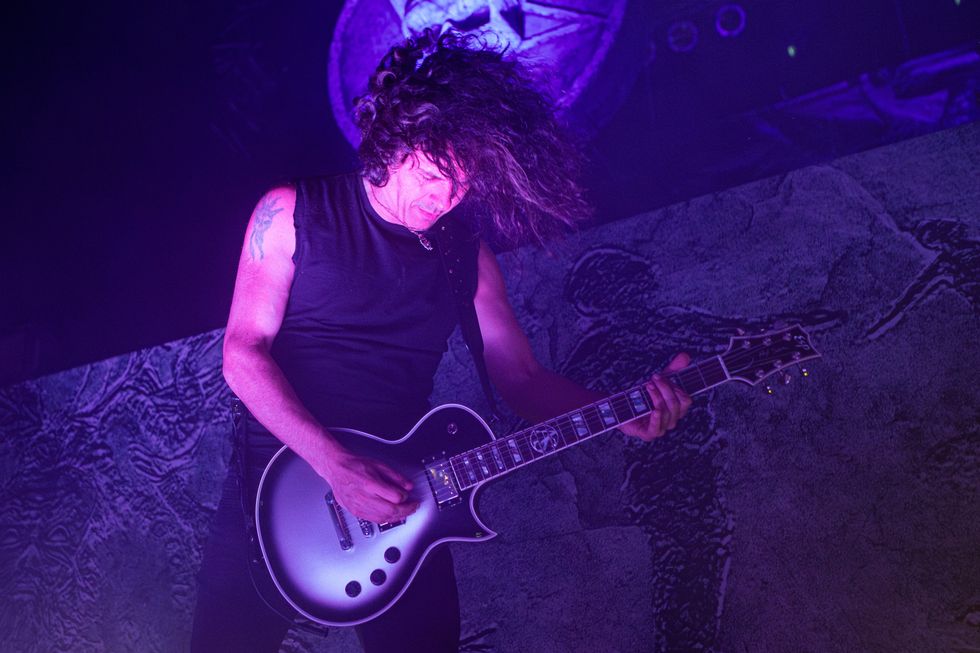
Alex Skolnick onstage with Testament, which he joined in 1983. After initially departing in 1992, he rejoined in 2005 and has stayed in the fold since.
Photo by Tim Bugbee/Tinnitus Photography
Guitars
- ESP Alex Skolnick FR with Seymour Duncan Alex Skolnick Signature pickups
- Allparts ’62/’63 Relic Stratocaster
Amps
- VHT D-50H
- VHT 1x12 speaker cabinet
Strings
- D’Addario XS or NYXL (.011-.049) for ESP Alex Skolnick
- D’Addario XS (.010-.046) for AllParts Strat
Picks
- Jim Dunlop Ultex 1.5mm
Effects
- TC Electronic Polytune
- JAM Pedals Wahcko
- JAM Pedals TubeDreamer 88
- J. Rockett Audio Designs Blue Note Overdrive
- Moollon Signal Boost
- Electro-Harmonix Micro Synth
- MXR Phase 95
- JAM Pedals WaterFall
- Crazy Tubes Circuits Splash
- TC Electronic Flashback
- Seymour Duncan Andromeda
- Electro-Harmonix POG2
- JAM Pedals Delay Llama (Custom Painted, Va
Gough “Starry Night”) + Expression Pedal - Earthquaker Devices Pitch Bay
- IK Multimedia AmpliTube X-Space Digital Reverb
- Line 6 DL4 MkII
- Boomerang III Phrase Sampler
- Dunlop DVP4 Volume (X)
Along with Jones and Grohowski, who have played with Brand X and other forward-thinking artists, Skolnick and Motzer have documented PAKT’s latest musical quests on the new, two-disc No Steps Left toTrace. Including their eight live albums, this is the group’s 10th release, featuring studio recordings and live performances. “We have four different players, from different areas of music, with mastery of their instruments, coming together,” asserts Motzer. “The chemistry was an immediate, ‘Wow!’”
Although all of PAKT‘s members are virtuosos, their work appears completely devoid of ego. “I’ve found over the years that, as a listener, I prefer a group dynamic to it being all about the individual,” Skolnick declares. “I have total respect for the featured soloist approach, but it’s not what I want to do. I can remember when I first got into jazz and improvised music, I took just as much interest in good accompaniment.”
Motzer maintains that the group isn’t consciously avoiding solo cliches. “In the early days of PAKT, Alex and I might blow a long time, and that’s cool, but what we’re trying to do now is more about the collective,” he says. “Forms are being created. Percy is finding the corners. We’re all identifying melody lines, little riffs that start giving shape to the piece that we’re doing.” Skolnick adds, “Sometimes you don’t need to play anything. Silence is great.”
Psychedelic Jazz Fusion
While PAKT performances are typically attended by metalheads, fusion enthusiasts, and general guitar nerds, the band has even started to attract fans of psychedelic music, à la the Grateful Dead, due to their spacier explorations—though Motzer notes that his psych influences are rooted in a myriad of British progressive bands. “My point of reference would be Gong and Steve Hillage’s solo work,” he explains. “Maybe Pink Floyd because I grew up with all that stuff. And King Crimson, of course—how can you not be inspired by them? So that probably peeks through.”
“Sometimes you don’t need to play anything. Silence is great.” - Alex Skolnick
On the other hand, Skolnick’s trippy propensities owe more to Brian Eno’s ambient music: “Another Green World is a big influence. I remember hearing those bass parts and thinking, ‘Wow! Who plays bass like that? That’s wild bass playing.’ Then, after we started PAKT, I was talking with Percy about it … and that’s him! That’s Percy!”
Additionally, Skolnick is inspired by early jazz-rock fusion recordings. “I’m influenced by space jazz from the late ’60s, early ’70s,” he explains. “For example, Terje Rypdal—I can’t believe more people don’t know his name. And Larry Coryell’s Spaces. It’s not music I’ve ever directly transcribed but I enjoy it as a vibe and listening experience. Also, Chick Corea’s Return to Forever before that was the band name and before he added guitarists. There’s something about those records that feels psychedelic. It was before jazz-rock was a genre, and the music is unpolished, uncharted, and exploratory. To me, that’s a big inspiration for PAKT.”And explore PAKT does. Unlike many jam bands who meander aimlessly through their improvs, PAKT’s music is more an investigation of rhythms, melodies, and tonalities: searching, discovering, developing, and moving on. As Motzer puts it, “It’s not like we’re going out to blow solos but more to create ‘sound worlds.’ It’s very much dealing with the unknown.”
The Serendipity of Effects
Alongside their technical virtuosity, a multitude of effects also play a major role in Skolnick and Motzer’s sounds. An abridged list of both guitarists’ effects reads like a Wikipedia entry on the history of guitar pedals. Still, whether creating the ethereal atmosphere on such tracks as “The Ghost Mill” or the abstract turbulence of “Wormhole,” the effects are consistently used in the service of the music, and sometimes dictate its trajectory.
“I really love when the pedals are doing stuff I didn’t expect,” says Motzer. “The sabotage aspect of pedals … I’ve always loved that. It just shoots the music off into some other terrain, and it’s something else to react to. I switch my brain off when I play and just listen and be and flow in the music. The pedals are an augmentation of that: more layers and textures that inspire me to go further.”
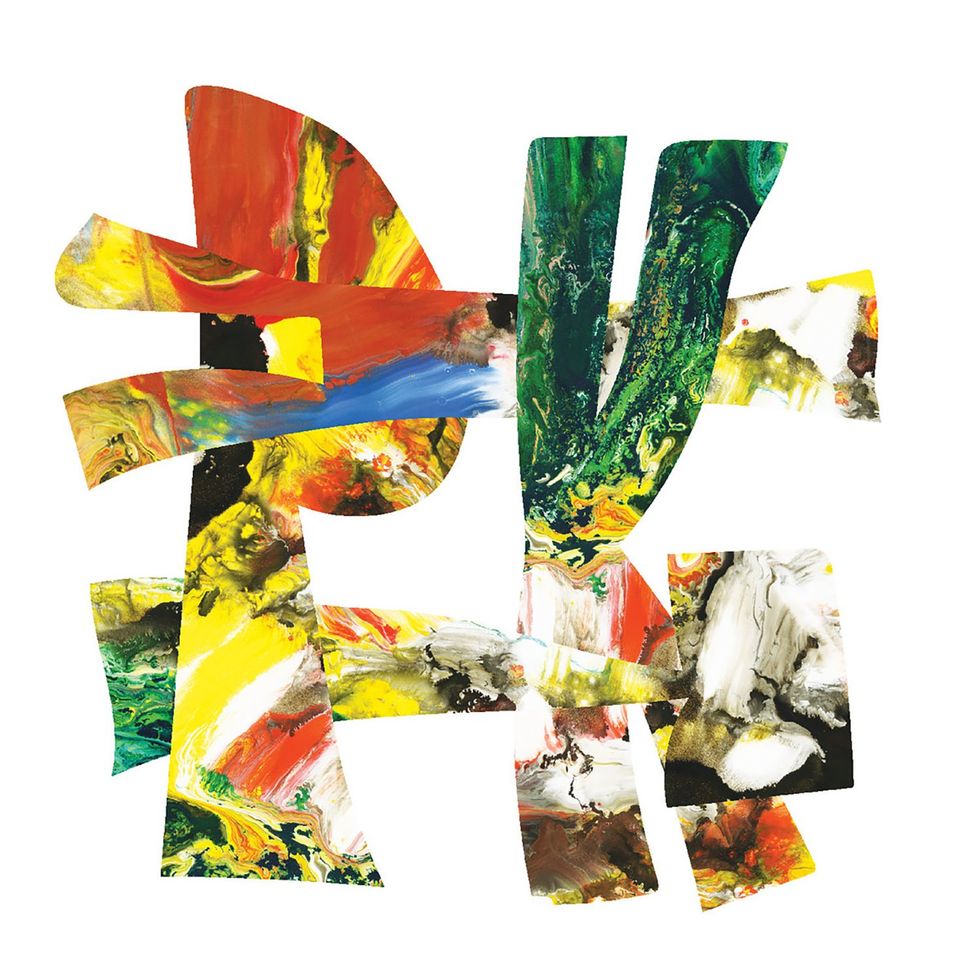
No Steps Left To Trace is a double-shot from the improv ensemble, featuring an LP of original compositions alongside a full live record.
Skolnick agrees: “When we start the show, I have my effects set so they’re pretty comfortable, but during the course of the show I will make adjustments and see where they go. Sometimes they go into uncharted territory.”
In addition to mainstays such as modulation, delay, and distortion, PAKT also incorporate a fair amount of live looping into their performances. These loops might be used for ambient drones, as heard on “On the Other Side, Part 1,” or to modify any given melodic line, as heard in “NYC III.” Motzer explains, “The multi-loopers can do different speeds. I have a Montreal Assembly pedal that plays an octave higher and twice as fast. It does some astounding things.”
Tim Motzer's Gear
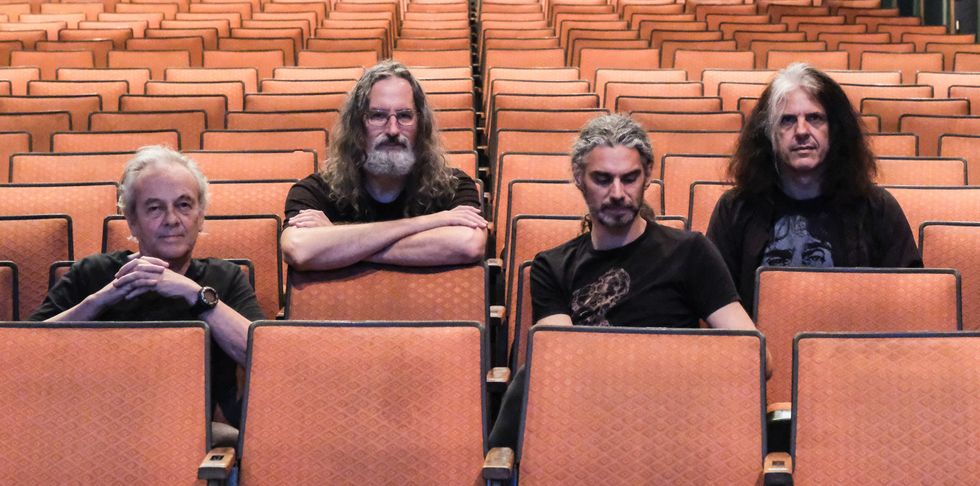
Decades before PAKT, Alex Skolnick (far right) had been influenced by Percy Jones’ (far left) bass on Brian Eno’s ambient recordings.
Photo by Avraham Bank
Guitars
- Takamine EF341SC
- Takamine EF381SC
- Godin Multiac
- Danelectro baritone
- G&L Comanche
Amps
- Fender Deluxe Reverb
- Fender Hot Rod Deluxe
Strings & Picks
- D’Addario 80/20 Bronze Acoustic Guitar Strings Light (.012-.053)
- D’Addario Electric (.012-.053)
- Ernie Ball Slinky (.010-.046)
- Jim Dunlop Jazztone 477-208 picks
Effects
- DigiTech Whammy Ricochet
- Eventide H9 Max
- TC Electronic Overdrive/Boost
- Chase Bliss Lossy
- Chase Bliss Blooper
- Red Panda Tensor
- Drolo Strands
- Paul Trombetta Burning Sensation
- Pigtronix Cosmosis
- Roland GR-33
From years of experience, Skolnick and Motzer have advice for players looking for new pedals. “We’re in the richest time for affordable effects,” Motzer says gleefully. “Pedals are coming from China that are $40, which actually sound good. So people can start out and grab pedals that don’t cost that much. It’s a transformational moment in sound.”
Skolnick concurs that one doesn’t need to break the bank to get new sounds. “Many conventional pedals have options that can get really outside,” he says. “If you take a reverb pedal and crank the decay, you suddenly get this instant atmosphere. Similarly, a typical chorus or flange pedal, if you crank the speed to 10, you’ll get this wild sound. Then I loop it. There’s a drone. Then I dial down the decay and I can play over that. Almost any pedal has an extreme function. One pedal in particular is the [JAM Pedals] Delay Llama, which has an independent expression pedal, and by turning that up and down it becomes not a guitar at all—wild, synthesizer-like sounds.” Skolnick warns that if you overindulge the pedal knobs, then you should play less on the fretboard, letting the effects do the work.
Skolnick says his signature ESP model is like “a hot-rodded Les Paul” with a whammy bar. “I was never a big whammy bar person, because by the early ’90s everybody was crazy with the whammy bar, so I told my guitar techs, ‘Lock up all the tremolo bars. I want to make a statement without that.’ But now, since I think I’ve proven I can get by without one [laughs], I’ve allowed myself to start using it.” In addition to his ESP, Skolnick plays an Allparts Strat with PAKT.
Meanwhile, Motzer’s main guitar for years has been a Takamine acoustic, which he plays “like a drum” with loops. This came out of Motzer’s performances with various dance troupes. “I could create these structures for dancers, and we’d interact back and forth, so we would improvise together,” he says. “That’s how that guitar ended up being my main axe. It just felt like more of a complete expression of who I am.” When asked if he was playing “guitar percussion” on No Steps Left To Trace, Motzer told me, “For sure, but I couldn’t tell you where!” For their 2024 tour, Motzer says he’ll switch things up with solidbody G&L and Godin options, the latter with a synth-guitar component.
The Ever-Unfolding Listening Ensemble
While both guitarists agree that there are plenty of improvisational tactics to keep their playing fresh and inventive, they’re adamant regarding the most vital aspect of group improv: listening. Skolnick attributes his listening habits in PAKT to the elite-level skill and imagination each of his bandmates have. “This group is just a great excuse to listen, to play things that accompany the whole picture.”
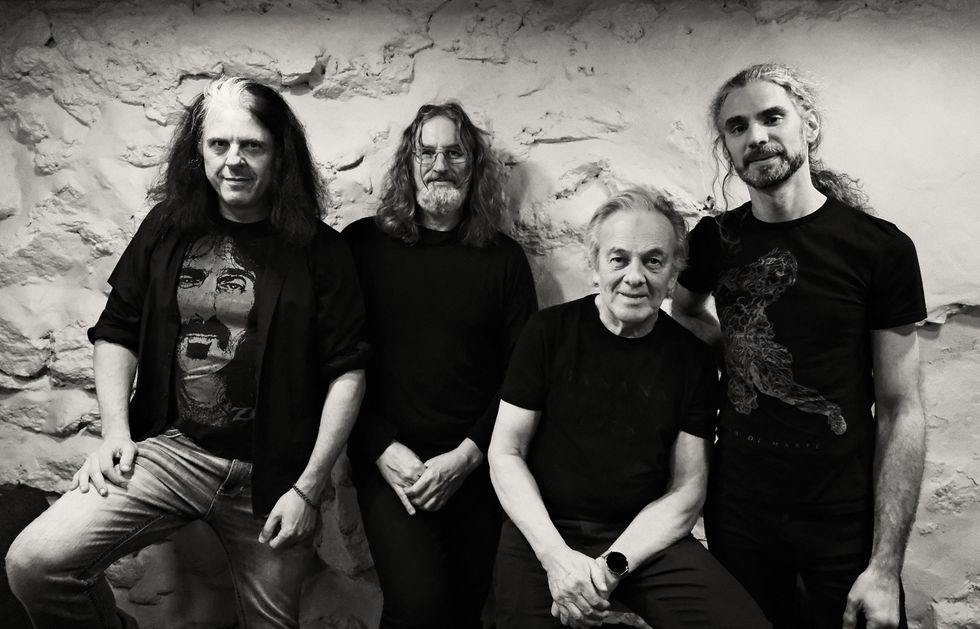
The individual skill levels in PAKT are off the charts, but the musicians are less concerned with their own playing, and more interested in listening to what their bandmates are doing.
Photo by Avraham Bank
Motzer sums it up: “It’s really about listening, reacting to each other, and trying to make the best music we can. When we play, we don’t know what’s going to happen. You don’t know what the mood of the night is going to bring. We are continually trying to unfold this thing that we have. And there is such a trust there that each time we get together, it gets more exciting.”
YouTube It
During the lockdown in August 2020, PAKT assembled in a Brooklyn studio to map out “Sacred Ladder” from their very literally self-titled 2021 LP, Percy Jones, Alex Skolnick, Kenny Grohowski, Tim Motzer.
Dave Pomeroy and a few of his best friends.
Organized labor has shaped the music we love, and Nashville Musicians Association president Dave Pomeroy believes musicians still need a fair deal.
“There’s always something to do in Nashville,” grins Dave Pomeroy. For Pomeroy, this is especially true. He’s the president of the Nashville Musicians Association (NMA), the city’s branch, or “local,” of the American Federation of Musicians (also known as AFM Local 257). The AFM is the largest musicians’ union in North America, representing around 70,000 music workers through more than 240 locals across the continent.
It’s no surprise that Music City’s local comes with a fair bit of history. Along with New York, Memphis, Chicago, and Los Angeles, Nashville is one of the most important cities in the trajectory of not only American music, but the business that shaped that music. As the recorded music and radio industries exploded in the 1940s and ’50s, musicians found themselves in uncharted waters. Suddenly, there were new and enormous revenue streams—royalties and record sales—and musicians weren’t getting their share. Record labels were getting fat off the surplus.
So, the AFM organized the biggest music workers’ direct action in history. For nearly two years between 1942 and 1944, the AFM’s roughly 136,000 members engaged in a recording ban: They refused to produce any new recordings for the record labels until they were guaranteed a fair cut of the new profits. Some top talents like Duke Ellington and Benny Goodman stood by the strikers. Others, like Frank Sinatra, scabbed, and used non-union musicians on their recordings when AFM musicians refused. (I guess that’s why it’s “My Way,” not “Our Way.”)
Dave Pomeroy & the All-Bass Orchestra: "Buckle Up"
The strikes were successful, though later challenges and divisions within the movement diminished the initial victories. Still, it showed that the collective power of organized labor could go toe-to-toe with corporations, and get what musicians are owed for the magic they create. Musicians nowadays, who are up “streaming creek” without a paddle, need as much help as they can get. “The music business doesn’t have to be a win-lose,” says Pomeroy. “It can be a win-win when everybody treats each other the right way.”
“The music business doesn’t have to be a win-lose. It can be a win-win when everybody treats each other the right way.”
Pomeroy was raised a military kid, born in Italy and later moving to England with his family in 1961. He got a head start on the Beatles, and stayed up late to watch them make their debut on The Ed Sullivan Show in February 1964. The Rolling Stones caught his ear just before his family uprooted to northern Virginia, where Pomeroy took piano lessons and played clarinet in the school band. He wanted to play the cello, but those spots were filled, so he took up the string bass at age 10. A couple years later, he discovered the bass guitar, which suited him just fine; he could dance around and sing with a bass hung across his shoulders. His parents helped him acquire a Gibson EB-2 (his hero Jack Bruce played Gibson basses, so he had to, too).
Pomeroy joined a folk trio in his second year at the University of Virginia in Charlottesville, a turning point when he realized music was his destiny. He left school and moved to Belgium, where his parents were stationed at NATO. He quickly moved to London, where he played in five different bands in a year. Following a short stint in Denmark (his Hamburg, he quips) his European sabbatical was over, and it was time to get back stateside. One of his bandmates from Charlottesville had a publishing deal in Nashville, so Pomeroy decided to give it a go. That was 46 years ago.
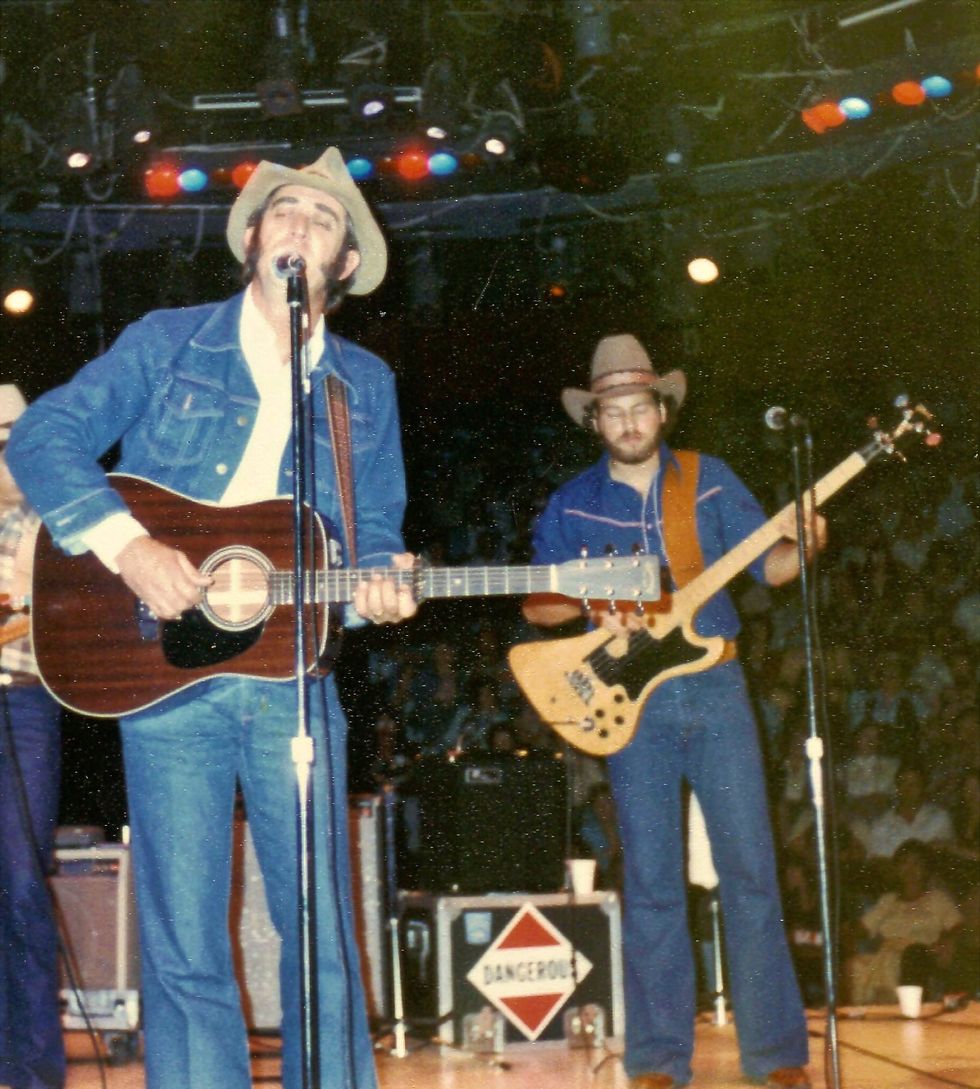
Pomeroy hit the road with Don Williams in 1980, and quickly learned the value of mutual respect and fair working conditions.
Rockabilly icon Sleepy LaBeef gave Pomeroy his first gig. LaBeef was a human jukebox, and would switch up sets every night. The law of the band was simple: Follow, or die. It was a crash course in ear and style training for Pomeroy. He bounced around until he landed his big break: backing up Texas country slinger Don Williams. Pomeroy played in Williams’ band for 14 years, from 1980 to 1994, and that time would shape the rest of his life. It was an incredible musical education, and it bridged him to new worlds in the music industry.
But more than those things, it was the consideration that Williams showed his musicians that changed Pomeroy’s life. “He treated us with great respect,” he explains, “and I didn’t realize for some time that that was not the norm, and that it was a lot worse for a lot of my colleagues and friends.” At 24, Pomeroy co-wrote a song with Williams, who helped get him a publishing deal. Williams also landed his road band a record deal on his label ,MCA and co-produced their self-titled “Scratch Band” record.
“He treated us with great respect, and I didn’t realize for some time that that was not the norm, and that it was a lot worse for a lot of my colleagues and friends.”
Working with Williams cemented the value of documenting his work with a union contract. In 1980, Williams and his band played a show at Giant Stadium in East Rutherford, New Jersey. A month later, Pomeroy’s friend called to tell him to turn his TV on. The gig had been recorded for Casey Kasem’s America’s Top 10 program, and was airing. Pomeroy was over the moon, but things got even better—a short time later, he got a $1,000 check for the airing. When it aired again, he got another $1,000.
Dave Pomeroy's Gear
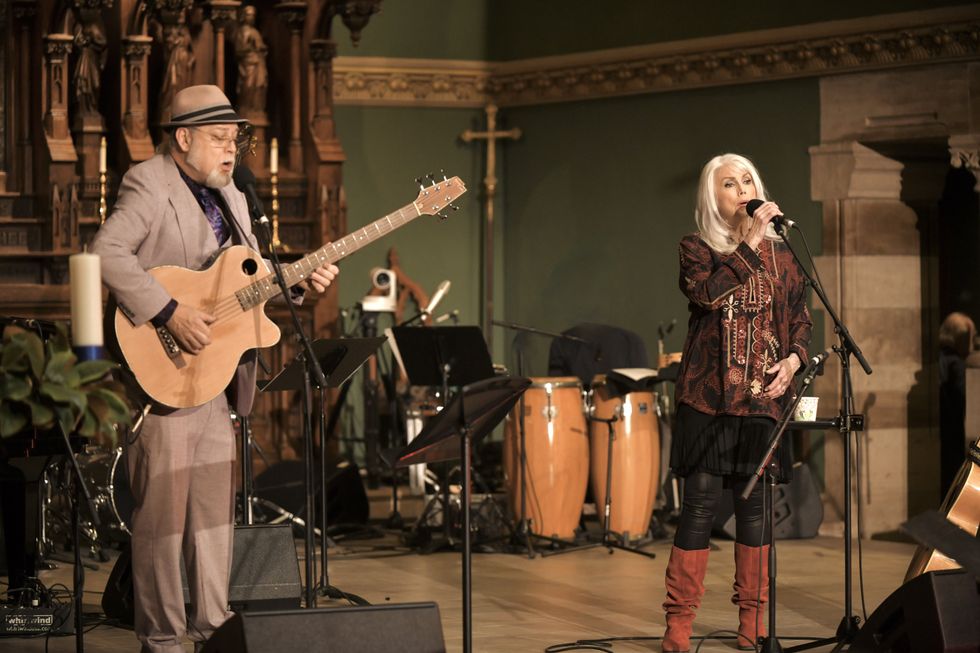
Over his 46 years in Nashville, Pomeroy has worked with the biggest stars of country and folk music. Emmylou Harris, performing with Pomeroy here in December 2023, brought him along to her sessions with the Chieftains in 1992.
Photo by Mickey Dobó
Basses
- Fleishman Custom 5-string electric upright
- 1967 Gibson EB-2
- G&L Fretted and fretless L-2000
- 1963 Fender Precision
- Alleva-Coppolo 5-string
- 1964 Framus Star Bass
- Reverend Rumblefish 4- and 5-strings
- Brad Houser 5-string
- 1980s Gibson Thunderbird fretted and fretless
- Lakland Jerry Scheff 5-string
- 1940s Kay
- Hamer 12-string
- Pedulla 8-string fretless
- Gold Tone Micro-Bass, Banjo, and Dobro
- Kala U-Basses – hollowbody and solidbody
- Jerry Jones 6-string baritone “tic-tac” bass
- Boulder Creek 4-string fretless and 5-string fretted acoustic basses
- Music Man 5-string
- Sadowsky 4-string
- Big Johnson – large acoustic fretted bass
Amps
- Genzler Magellan 800 Head with Genzler cabs
Effects
- Boss GT-10B
- Boss RC-50
- Boss RC-600
- SWR Mo’ Bass preamp
- Ampeg SVT preamp
- Line 6 Bass POD Pro
- Avalon U5 Class A Active Instrument DI and Preamp
- Trace Elliot V-Type preamp
- Morley wah pedal
- Morley volume pedal
Strings
- GHS Pressurewound, Brite Flats, Boomers, Flatwounds, and Round Cores
- Thomastick acoustic bass strings
“I thought, ‘Holy moly, this is how this stuff works?’” remembers Pomeroy. “There were so many times that we’d find out about these things with other artists, and nobody bothered to say anything; nobody turned it into paperwork. [They would say,] ‘Oh, I didn’t know we were supposed to get paid.’ I didn’t know we were supposed to get paid, but somebody took care of it. That was just the way Don was.”
Over the years, Pomeroy would perform and record with many celebrated artists, musicians, and songwriters in country, folk ,and bluegrass music, such as Earl Scruggs, Guy Clark, George Jones, Emmylou Harris, Chet Atkins, and Alison Krauss. He honed his voice on the instrument when he got an upright fretless electric bass, which he played on Keith Whitley’s 1988 record, Don’t Close Your Eyes. Pomeroy’s dramatic downward slide on “I’m No Stranger to the Rain” had his phone ringing off the hook. Harris invited him to play on her album, “Bluebird,” and he also joined her recording with The Chieftains in 1992, when she asked him to bring along “the bass from space,” her nickname for his electric upright. Pomeroy’s outside-of-the-box streak continued on his performances and arrangements of his song “The Day the Bass Players Took Over the World,” and his All-Bass Orchestra.
“They basically said, ‘Hey, these are our friends, and we’re not going to screw them over … We’re going to do this right.’”
Eventually, his path curved toward the studio world, where he started to take more notice of the local union’s role in making music. In the early 2000s, Pomeroy gravitated towards a subgroup of the AFM called the Recording Musicians Association, where he revived a sense of participation and engagement in negotiations. In 2008, he ran against the NMA’s incumbent president, Harold Bradley, who had held the post for 18 years. Pomeroy won the election, and has held the seat ever since.
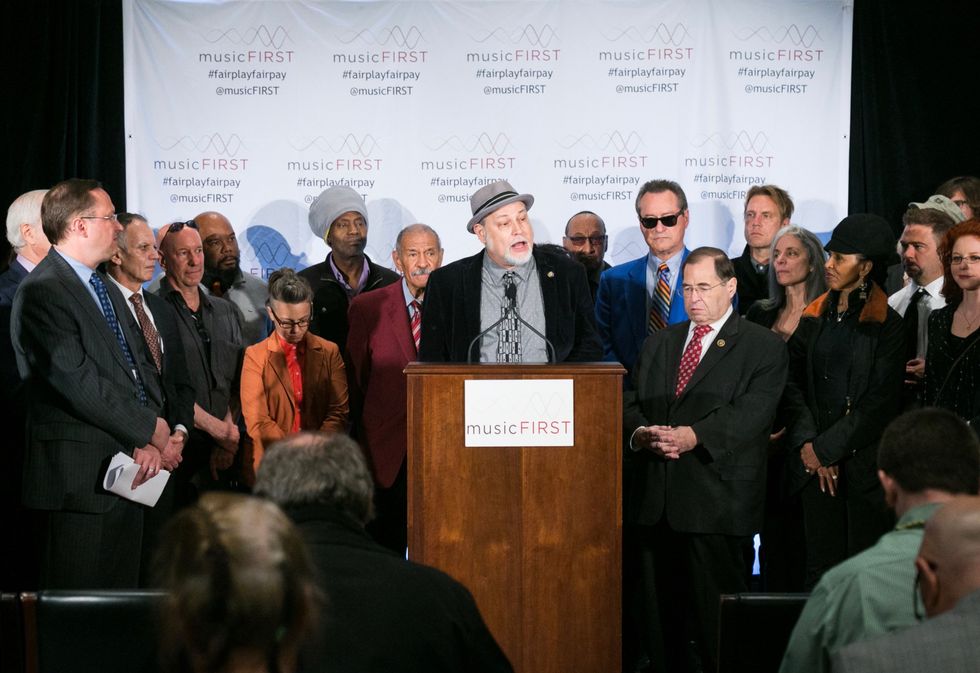
Pomeroy has advocated for better working conditions for artists for decades, including supporting the Fair Play Fair Pay Act in 2017, which addressed issues with terrestrial radio.
Photo courtesy of the Music First Coalition
The AFM’s single-song overdub scale agreement, a/k/a home studio contract, was created by NMA in 2012, and it wasn’t easy. There were drawn-out debates over where the pay floor should be. “Are we talking about ‘Mary Had a Little Lamb’ or are we talking about Mahler’s Symphony No. 6?,” says Pomeroy. The minimum, they decided, was $100, which can be negotiated upwards, depending on the difficulty of the job. But instead of simply being handing the player a crisp Benjamin, the employer would sign a piece of paper allowing the player to pay into their own pension, a first for AFM musicians.
The AFM “Tracks on Tour” contract was also a NMA creation. When Dolly Parton and Jason Aldean wanted to use recorded tracks onstage as part of their shows, they went to the NMA to work out how to do it right.
“I’m nice, but I’m also very persistent. I’m a Taurus. I’m not going to let things go. We’re going to work this out.”
Parton wanted a saxophone part in one of her songs without touring with a saxophonist, and Aldean wanted to use the acoustic guitar and piano from his hit ballad with Kelly Carson, “Don’t You Wanna Stay.” So, the NMA studied a Broadway touring show’s pay rates to come up with a scale for that situation, and the performers whose recorded work was being played earned up to $12,000 extra in a year, thanks to the formula. Some artists, says Pomeroy, can scheme their way around the scales by getting their road band to rerecord the parts for less money. “But a lot of artists are willing to pay to have the good stuff,” he says.
Pomeroy explains that at the start of its golden era, Nashville’s recording business was built on respect between employers and creators. Big labels like Decca and RCA Victor were run by Owen Bradley and Chet Atkins, respectively, and even though the labels wanted to turn a profit on “hillbilly music,” Bradley and Atkins were wise enough to know that they ought to give musicians a fair deal. “They basically said, ‘Hey, these are our friends, and we’re not going to screw them over. We got to play with them Saturday night at the country club, so we’re going to do this right, and do it on a union contract,’’ Pomeroy shares.
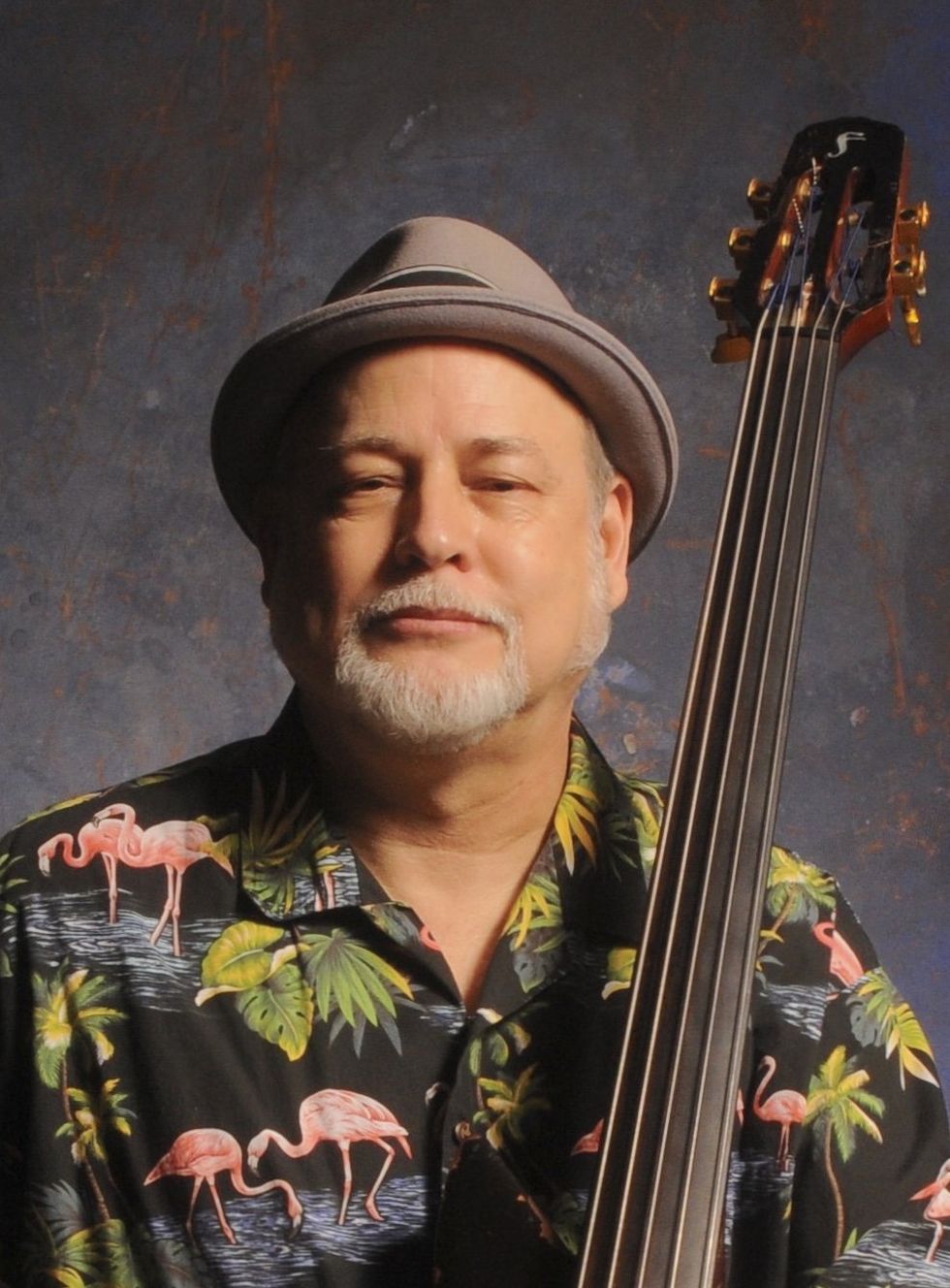
Pomeroy’s music and union work aren’t separate—they’re both part of a single vision, where artists can create and perform with dignity.
Photo by Jim McGuire
Sometimes, the dividends for doing this “right” are immediate and obvious. But other times, like Pomeroy experienced, they might take a little while to manifest. In 2014, Mazda used Patsy Cline’s “Back In Baby’s Arms” in a commercial for their new RX-7 car that ran for 2 years. A 90-year-old violinist who played in the song’s string section came into the NMA offices one day to pick up a New Use check for nearly $2,000. He told Pomeroy he’d been paid $57 to record his parts back in 1962. “That makes all the work worthwhile,” says Pomeroy.
A decent chunk of his work, says Pomeroy, falls into dealing with well-meaning people who might not have known they were shortchanging a musician, but need some reminding, all the same, to pony up. Other times, he and the AFM have to push a little harder to get musicians what they’re owed. “I chase people down,” says Pomeroy. “I’m nice, but I’m also very persistent. I’m a Taurus. I’m not going to let things go; we’re going to work this out.” Pomeroy says they’ve successfully sued for nearly a million dollars from employers who “didn’t want to do the right thing, and got to do the right thing the hard way.” Some of those people end up on Music City’s “Most Wanted”: the Nashville Musicians Association’s “Do Not Work For” list. It exists to warn both performers and the public about employers who are known to either break union contracts, or solicit union musicians to work outside a union contract.
All of this might seem separate or secondary to the actual creation and performance of music. But that belief, whether held subconsciously or expressed explicitly, is what has allowed musicians to remain overworked and underpaid for the past century, or more. If we really believe that music brings value to our lives, why shouldn’t the labor that enables its creation be supported fairly? And besides, musicians are workers like any other. If you saw a boss raking in stacks of cash while their employees struggled to make rent, you’d be pissed off, right? Well, that’s the situation a lot of music workers find themselves in these days. Pomeroy and the AFM have their work cut out for them.
But, it’s easier for Pomeroy when he sees a common ground between his music work and his union work. Sometimes, they collide, like on his song, “What Unions Did for You.” Each feeds and emboldens the other. “I have to have the creative stuff to balance out the administrative stuff,” says Pomeroy. “But in a lot of ways, the admin stuff that I do is a lot like being a bass player. You’re rushing, you’re dragging, it’s right here in the middle; let’s see if we can find that place where everybody’s gonna feel good.”
YouTube It
Dave Pomeroy bops through a solo performance of the riotous, bassman’s-rights tune “The Day the Bass Players Took Over the World” at the Country Music Hall of Fame.
For their new record, Judas Priest turned back the clock to time warp some of their ’70s prog-metal spirit into 2024.
On their new album, Judas Priest brandish an Invincible Shield of righteous heavy metal.
When people talk about Judas Priest, the band’s biggest hits easily spring to mind, and rightfully so. “Breaking the Law,” “Living After Midnight,” “Heading Out to the Highway,” and “You’ve Got Another Thing Comin’” were the songs that made the iconic British metal band a household name in the ’80s. But long before such MTV-friendly anthems catapulted them into superstardom, and more recently, earned them a nod from the Rock and Roll Hall of Fame in the Musical Excellence category, Judas Priest cut a more progressive rug.
Their ’70s-era albums, like Stained Class and Sin After Sin (the latter featuring session drummer extraordinaire Simon Phillips), are masterworks of early progressive metal. Songs like “Victim of Changes,” “Sinner,” and “Beyond the Realms of Death” exude a stylistic depth and structural breadth that was mostly shed during their ’80s heyday. The rhythms—bass and drums in particular—were more adventurous, and the arrangements more intricate. It’s a style of music that would subsequently evolve through bands like Iron Maiden, Dream Theater, and others who have since come to define and expand the genre.
On their new album Invincible Shield, Judas Priest is retrieving a bit of that musical heritage. “I said a long time ago, when we were writing these songs, that they came out a bit more progressive,” says lead guitarist Richie Faulkner. “It’s not progressive like Dream Theater or Rush, but there are a few more twists and turns musically.” Indeed, the songs on Invincible Shield are definitely more complex than one might expect from the band, with many of the arrangements more akin to their ’70s period than the following decade’s crowd-pleasers. Songs like “Panic Attack” and “Trial By Fire” are either built around, or feature significantly, odd-time riffs, a far cry from the 4/4 time signatures Judas Priest built their global success around. Throw in a heaping cup of Screaming for Vengeance-era ferocity in terms of delivery on songs like “Gates of Hell” and “Crown of Horns,” and you have the basic ingredients of Invincible Shield. Bass player Ian Hill, who has been going through the set list for the upcoming tour, is also connecting the musical dots to past works. “The things I’m running through, like ‘Victim of Changes,’ ‘Sinner,’ and ‘The Sentinel,’ are all in the same mold,” the bassist explains. “There are lots of different parts—light and shade—it’s not just all one thing or another. And Invincible Shield is very much like that.”
Judas Priest - Crown of Horns
Originally formed in Birmingham, England, in 1969, Judas Priest has been through an unusually long list of lineup changes, with the core of the band evolving to include guitarists K.K. Downing and Glenn Tipton, bassist Ian Hill, and singer Rob Halford by the release of their debut LP, Rocka Rolla, in 1974. A revolving cast of drummers, including Les Binks and the aforementioned Phillips, mostly ended when Dave Holland joined in 1979, occupying the position for 10 years. Following his departure, Scott Travis joined and has been with the band ever since. Downing left the band in 2011, replaced by Faulkner. Tipton remains an official member of Judas Priest, but his touring activities have been limited since 2018 due to Parkinson’s disease, with Firepower and Invincible Shield producer Andy Sneap filling in for him on the road.
“There are lots of different parts—light and shade—it’s not just all one thing or another.” —Ian Hill
The elements of early Judas Priest’s sound, including Halford’s operatic vocal style and the twin-guitar power of Downing and Tipton, forged a template that would help define the heavy metal genre. Their 1977 release Sin After Sin was their first under a major label, and the first of 10 consecutive records to be certified Gold or Platinum. Then, 1980’s British Steel brought them notable mainstream attention with hits “Breaking the Law” and “Living After Midnight.” A decline in exposure during the mid 1990s, coinciding with Halford leaving and being replaced by Tim “Ripper” Owens, seems a distant memory, as the 2000s saw the band once again become a major force within the metal community. They were inaugural inductees into the VH1 Rock Honors in 2006, received a Grammy Award for Best Metal Performance in 2010, and had their songs featured in popular video games such as Guitar Hero and Rock Band. 2018’s Firepower was the highest-charting album of the band’s career, and in 2022, Judas Priest were finally inducted into the Rock and Roll Hall of Fame.
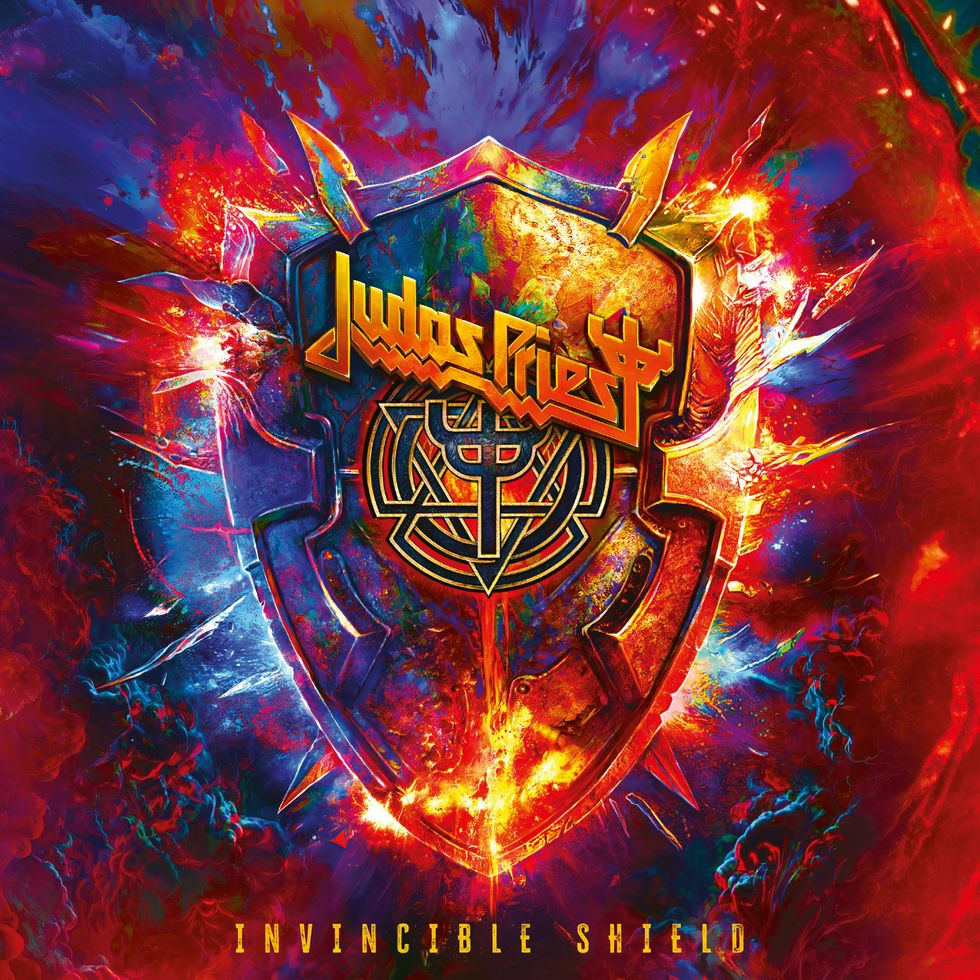
Judas Priest caused quite a stir online when they announced the title and artwork for their 19th studio record, but Richie Faulkner says it’ll all make sense in the end.
Priest’s musical renaissance on Invincible Shield certainly adds greater dimension to their signature sound, but it isn’t really about taking a trip down memory lane. The nod to the past is mostly tangential. The real impetus was wanting to scratch a particular collective itch. “It’s a question of, ‘What can we do different? How can we make this more satisfying as a piece of art?’ If that doesn’t sound too pompous,” explains Faulkner. “You want to challenge yourself and you want to build upon what you’ve done already.”
“It’s a question of, ‘What can we do different? How can we make this more satisfying as a piece of art?’” —Richie Faulkner
Priest has never really been a band to repeat themselves too often. Yes, they’ve followed trends and exhausted songwriting formulas, but they’ve always adapted to changing times and band members. Between Andy Sneap’s fiery, modern production, Faulkner’s youthful and aggressive influence, and the underlying DNA—four of the guys in the band have been there for decades—Judas Priest pull off a pretty compelling hat trick on Invincible Shield. “You want to do something that’s going to be challenging, but also satisfying to us as creative people, and hopefully ticks the boxes for the fans as well,” says Faulkner.
There was, however, a bit of backlash from fans on social media over the album’s title and artwork when it was first announced—commenters felt it was boring and “cheesy”—but Faulkner says context will hopefully bring it all together. “I saw the comments,” he says. “I don’t stick my head in the sand. It’s heavy metal, it’s the shield that we all fly proudly and get behind, and it’s the thing that binds us together.” When the name, the artwork, and ultimately the music all come together, it will make sense, he says.
Glenn Tipton's Gear

Illness has forced veteran lead guitarist Glenn Tipton, pictured here in 2001, to step back slightly from his duties in Judas Priest, but it didn’t stop him from shredding on Invincible Shield.
Photo by Frank White
Guitars
- ESP GT-600 Signature Model with Glenn Tipton Signature EMG GT Vengeance Pickup Set
- Hamer Phantom GT Signature Model
Amps
- Engl Invader II E642II
- Engl E412VGB 4x12
Effects
- dbx 166A 2-Channel Compressor/Limiter
- DOD FX40B Equalizer
- Dunlop DCR-2SR Cry Baby Rack Module
- Mike Hill Services A-B Both Amp Switcher
- Rocktron Intellifex 24-Bit Digital Effects Processor
- Yamaha SPX90II Digital Multi-Effects Processor
Strings & Picks
- Ernie Ball Custom Gauge (.009–.038)
- Ernie Ball .46 mm picks
With Tipton sidelined and Downing out of the fold for more than a decade now, much of the writing and recording on Invincible Shield fell on Faulkner’s shoulders. Tipton is still contributing from the bench, but it’s Faulkner’s show now. When asked about the musical direction on Invincible Shield, Tipton adds, “It is definitely a case of Richie joining the writing team with his own individual ideas and going at it from slightly different angles.”
“It’s a question of, ‘What can we do different? How can we make this more satisfying as a piece of art?’” —Richie Faulkner
One noticeable difference wrought by those writing angles is the standout performance on Invincible Shield from Ian Hill. Though he’s been historically overlooked in the annals of great metal bassists, Hill has been the foundation of Judas Priest from the beginning, and is, in fact, the band’s only full-time original member. On Invincible Shield, he proves to be more than a root-note-pumping low-ender. Songs like “Panic Attack,” “The Serpent and the King,” and “Giants in the Sky” feature what Hill would call “busy bass work.” There are a lot of unison riffs between the bass and guitars, more along the lines of what you might expect from Iron Maiden, for example, or Stained Class Priest, even. Yet Hill’s approach remains simply focused on the songs. “I’ve always not done much more than what’s necessary,” he explains. “If you’re putting too much on it, you’re actually detracting from the song. This time around, the songs are busier and called for a little more movement.”
Richie Faulkner's Gear

Richie Faulkner has been a member of Priest since 2011, but he still gets nervous showing song ideas to his bandmates.
Photo by Tim Bugbee
Guitars
- Gibson Flying V Signature Custom with Richie Faulkner Signature EMG 57/66 Pickup Set
- Gibson Custom Shop Flying V with Floyd Rose
- Gibson Custom Shop Flying V
- Gibson Custom Shop Explorer
- 1983 Gibson Les Paul Custom
- 1976 Gibson Les Paul Custom
Amps
- Marshall JCM800 2203
- Wizard Modern Classic II
- Wizard GCL 4x12 with Celestion G12H-150 Redback speakers
Effects
- Boss DD-7 Digital Delay
- Boss SL-2 Slicer
- Dunlop JC95B Jerry Cantrell Signature Rainer Fog Cry Baby Wah
- Dunlop JD4S Rotovibe Chorus/Vibrato
- Dunlop DCR-2SR Cry Baby Rack Module
- MXR Micro Chorus
- Wampler Tumnus Deluxe
- Wizard Gate Minder
- RJM Music Technology Effect Gizmo Audio Loop Switcher
- Voodoo Lab Pedal Power 2 Plus
Strings & Picks
Unlike Firepower, an album they had the luxury of recording together, Invincible Shield was done remotely, largely due to the pandemic. “The bare bones of these songs have been around since 2020, just before the lockdowns happened,” recalls Faulkner. After the lockdowns were lifted, the band went back out on the road for their 50th Anniversary tour, and scheduling conflicts ensued. Not to be deterred, and with enough experience to know there’s never a perfect time to do something, the band decided they were going to record the new album however they could, rather than wait for the perfect moment. “Sometimes you just have to do what you can do with the tools that you have,” says Faulkner. “So, I recorded the guitars in my studio at home. The drums were recorded in Nashville, and Rob’s vocals in Phoenix.” Hill actually put most of his bass lines down in hotel rooms on the last tour. “Andy is with us anyway, and he’s got his laptop,” Hill explains. “And you get these days off where you’re sitting around doing nothing, so we figured we might as well be productive. It was a great way to do it, just me and Andy. You’ve got another pair of eyes and you can try different things for the same part.”
“I’ve always not done much more than what’s necessary.” —Ian Hill
Invincible Shield is also a testament to how technology has revolutionized the process of making records, even for Rock and Roll Hall of Fame inductees. Faulkner tracked his guitars at home using the Neural DSP Quad Cortex on a Marshall plexi-like setting. He then sent Sneap that sound along with a clean DI, so he could reamp it. “I think it was a Marshall JCM800 that he used. It’s a new combination—I’m joking,” he laughs, citing the holy grail of rock guitar amps. Faulkner says Sneap also put some gain boost in the front. “He’s a fan of the EVH 5150III and he had some plexis that he was using as well, so I’m not sure how he blended them, but that’s what he usually uses.”
Ian Hill's Gear
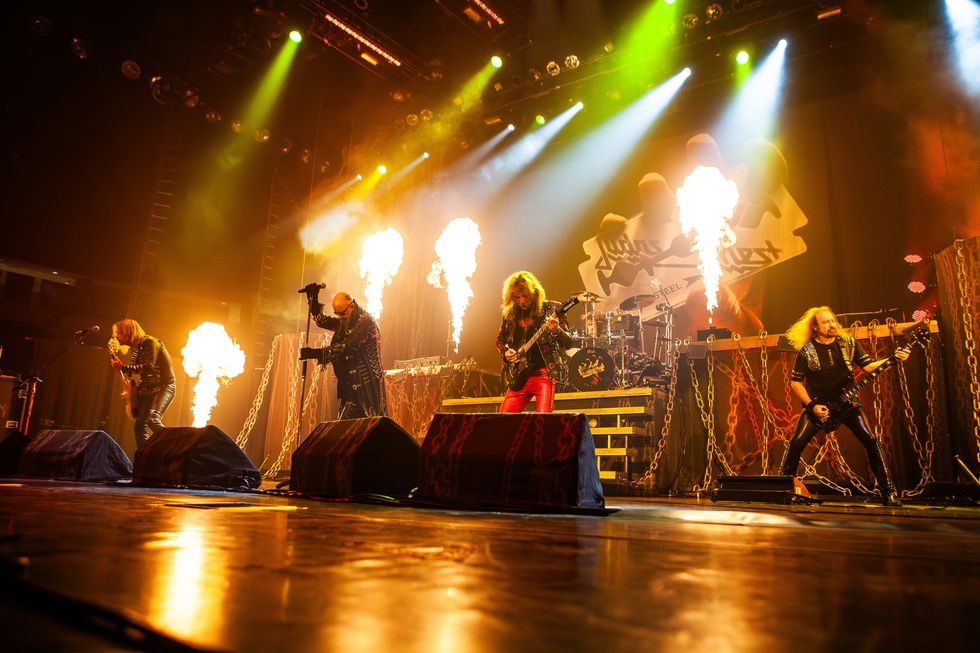
This year mark’s Judas Priest’s 55th year as a band, but they’re still chasing artistic and musical goals. “There’s always a challenge in making art,” says Faulkner, “and that’s what makes it special.”
Photo by Tim Bugbee
Basses
- Four Spector Limited Edition Euro4 Ian Hill basses, two tuned to D#–G#–C#–F#, and two tuned to A#–D#–G#–C#
Amps
- SWR SM-1500
- SWR Triad 3-Way Bass Speaker System
Effects
- Boss ME-50B Bass Multiple Effects
- Boss NS-2 Noise Suppressor
- Mike Hill Services ABCD Guitar Switcher
- Mike Hill Services Earth Loop - Ground Hum Eliminator
- Shure AD4D Two-Channel Digital Wireless Receiver
Strings & Picks
- DR Black Beauties BKB-50 K3 Black Coated Bass Strings
- Dunlop Nylon Standard .73 mm picks
- Signature InTune plectrums
Tipton says the rhythm guitars are put down to create a certain sound throughout the album, but for lead breaks, they will try anything to create the sound they want. “I’ll tweak [my sound] with different mikes and effects,” he explains. “Andy is very good with shaping the guitar sounds, and he knows what he needs to do to get it to sound like Priest.” The bass runs clean, direct to a laptop via an interface. Hill says this has been his approach for some time. “You need a clean bass sound—one that cuts through the two distorted guitars,” he says. “Anything that needs to be changed, or any effect that needs to go on, is put on afterwards.”
As for the actual songwriting process, Tipton says it remains more or less the same, whereby he, Halford, and Faulkner all produce ideas separately then pool them together. But Faulkner has a slightly more nuanced take on the songwriting process, one that you might expect from someone who grew up a fan of the band.
“It’s heavy metal, it’s the shield that we all fly proudly and get behind, and it’s the thing that binds us together.” —Richie Faulkner
“It’s the scariest thing,” he admits. “Let’s say you take fifteen ideas, they’re not complete—they’re just ideas that you think are winners. Then, it’s your turn to put your stuff on and show the room. You think it’s good, but then you put it on in front of Glenn Tipton and Rob Halford, you’re thinking, ‘Oh my god, what have I done here?’ Because all of a sudden, all your stuff sounds like shit,” he laughs. “I think that’s just the insecurities, and then you realize, they put ideas forward and they’re thinking the same thing.” One of the things Faulkner appreciates about this process is that it challenges him to think differently about his own ideas. “Glenn might say, ‘Turn that bit around,’ or ‘Change the feel in that bit.’ And then I do it and it’s like, ‘Ah, that’s actually unique. I wouldn’t have thought of that.’ And that’s when having three creative minds in the room makes the end result a lot better.”
When it comes to crafting and tracking his guitar solos, Faulkner says about 75 percent of it is improvised. “We press record and let it rip,” he explains. “You do that three or four times and a couple of things become constant, subconsciously, and they stick, and so you build around that.” There are a few songs he worked out before recording, including “Panic Attack,” “Invincible Shield,” and “As God Is My Witness.”
“It’s your turn to put your stuff on and show the room. You think it’s good, but then you put it on in front of Glenn Tipton and Rob Halford, you’re thinking, ‘Oh my god, what have I done here?’” —Richie Faulkner
Circling back around to the way Invincible Shield was pieced together remotely, Faulkner says there are always challenges when you record music. “Whether it’s Jaws and the shark is not working, or it’s our situation, there’s always a challenge in making art and that’s what makes it special,” he says. “The challenge for us was getting Invincible Shield to sound cohesive while recording it separately. By overcoming those challenges, it arms you for the next one, and you do it again and hopefully grow.”
YouTube It
At their 2022 Rock and Roll Hall of Fame induction, Judas Priest unleashed a three-guitar attack with K.K. Downing, Glenn Tipton, and Richie Faulkner.
Illustration by Kate Koenig
Ready to try cutting guitar tracks as a freelancer on your DAW? You’re joining a rich tradition, and a trio of domestic shredders are here to help you sound your best.
Do-it-yourself recording is a great musical tradition. Machines for capturing sound were available for home use as early as the 1930s. Famously, in the late ’30s and early ’40s, ethnomusicologist Alan Lomax, a lover of folklore and American music, followed in the footsteps of his father, John Lomax, and drove a 1935 Plymouth sedan across the United States with some tapes and a recording machine in the trunk. In August 1941, he captured musicians on their front porches and in living rooms across the American South, including one 28-year-old McKinley Morganfield—better known by his stage name, Muddy Waters. When Waters heard himself on tape, he was deeply moved. “He brought his stuff down and recorded me right in my house, and when he played back the first song I sounded just like anybody's records,” Waters told Rolling Stone back in 1978. “Man, you don't know how I felt that Saturday afternoon when I heard that voice and it was my own voice.” Lomax’s field recordings (trunk-recordings, perhaps?) are a significant jewel in the American Folklife Center’s treasury at the Library of Congress.
The apartment-ready 4-track tape recorder changed the game in the ’70s, then the next decade’s digital advancements blew the doors clean off the studio system. Suddenly, artists could handily create their own recordings from home, and they weren’t half bad. Check out Morphine’s 1993 radio hit “Cure for Pain,” for an example. The horns were recorded on a 4-track in frontman Mark Sandman’s Cambridge, Massachusetts, loft. (Listen closely and you can hear the effect the slightly stretched tape had on their sound.)
“They were really experimenting with unorthodox recording techniques to get previously unheard sounds onto records, and you can still incorporate that philosophy into digital recording.” - Rich Gilbert
As time went on, some went all-in. Venerated alt-rock outfit Deerhoof, who had used a 4-track to record their 1997 album, began making records with laptops and Pro Tools starting in 2000. “It seems like you can either go to a medium- or high-budget studio for one day, or you can use the equipment you have or can borrow from friends, and do it as long as you want,” drummer Greg Saunier said in a 2006 interview. “I realized there was no comparison—the time was so much more valuable than the fanciness of the equipment.”
Home recording equipment for guitarists has basically moved at the speed of light since 2006, and now many of the pros don’t even leave the comfort of their own nest to lay down award-winning tracks. There are plenty of reasons for that (besides the ability to do it in your pajamas). Recording your own guitars in your own space can be incredibly empowering: It’s an exercise in self-sufficiency and independence, both of which can be rare commodities in the world of recorded music. Perhaps most importantly, it doesn’t require a stack of cash to get recordings that you like.
“Sometimes, recording in a DAW, it can sound like you’re on top of the music if you’re recording in a collaboration.” - Ella Feingold
Of course, there’s a spectrum of approaches. Some rely on big-money gear to get the job done, but just as many will swear by cobbling together a home-brew sound setup that matches the project. And besides, it’s not all about the equipment. Recording guitar parts on your own in your dwelling is a unique process with its own complexities, not all of which can be captured and explained in instructional YouTube videos. That’s where battle-tested insights come in handy.
So, I asked three guitarists—a studio heavy-hitter to the stars; a “legendary” long-time independent punk; and an alt-rock up-and-comer—how they cut record-worthy 6-string tracks at home. Here’s what I learned.
Ella Feingold
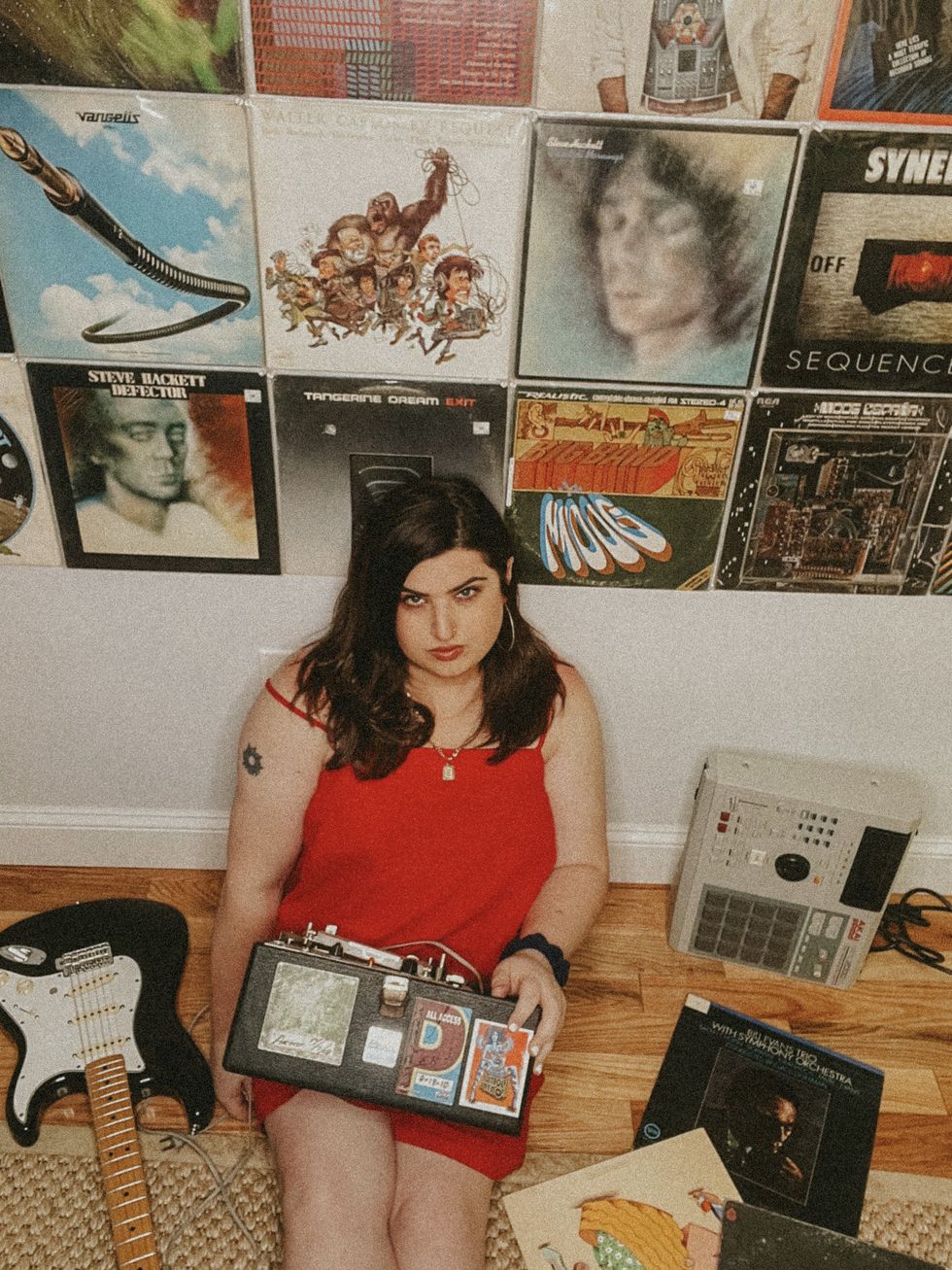
Flanked by records from Tangerine Dream and Vangelis, Ella Feingold clutches her home studio’s secret weapon: a ’60s Maestro EP-2 Echoplex.
When Ella Feingold started recording at home in 2002, the Digidesign Digi 001 was the tech of the day. Feingold always wanted to figure out how guitar parts and overdubs worked together, be they on a Barry White record or a Motown guitar section, so she set to recreating those layers with the recording system. It wasn’t long before she was working on overdubs for other artists with her new rig, and the practice turned into a career. Now, she’s known for her work with Silk Sonic, Questlove, and Erykah Badu, and on Godzilla: King of the Monsters.
Feingold began her career when everyone still gathered in the studio and recorded to tape, so she’s familiar with the feeling and energy of creating something together rather than in isolation. The key to avoiding Lone Musician Syndrome, she says, is to find a way to get inside the music rather than playing on top of it. “Sometimes, recording in a DAW, it can sound like you’re on top of the music if you’re recording in a collaboration,” she says.
There are technical remedies for this, like plugins and impulse responses (IRs) that can help mimic atmosphere or certain room sounds. But there’s a philosophical angle to it, too. When Feingold gets a project, she first listens to it over and over with no instrument in her hand. The idea is to rein in your instincts. Sometimes, they’re helpful. But other times, they let you drift to familiar sounds, progressions, or timings. Feingold will jot notes based on what pops into her head on those first listens, but only later will she pick up a guitar to arrange a part, and see how those initial reactions actually fit with a patient, considered read on the music.
Ella Feingold's Home Studio Gear
Guitars
- 1981 Gibson ES-345 Stereo
- 1967 Vox Super Lynx
- 1967 Goya Rangemaster
- 1950’s Kay Thin Twin
- 1981 Ibanez GB10
- Fender Nile Rodgers Hitmaker Stratocaster
- 1972 Fender Telecaster
- Fender MIM Stratocaster (strung for inverted tuning)
Amps
- 1966 Fender Princeton Reverb
Effects
- Maestro EP-2 Echoplex
- Maestro Boomerang BG-2 Wah Pedal
- Maestro PS-1A Phase Shifter
- Maestro FZ-1A Fuzz-Tone
- Maestro FSH-1 Filter/Sample Hold
- Zoom 9030
Interface, Mics, and Monitors
- Acme Audio DI WB-3
- BAE 1073
- Ableton Live
- RCA 77-D
- Electro-Voice 635A
- Yamaha NS-10
- Dynaudio BM-15
Feingold’s biggest gripe with home recording is engineering for herself. When she records direct into her interface, it’s no issue, but miking, listening, and tweaking mic position ad infinitum is a major drag—especially if a client has revisions on your work. Say you recorded a lead part in 8th notes, and they tell you a week later that they want a portion of it redone in 16ths. If you recorded those parts on a miked amp, there’s a good chance it’s not set up the same way anymore, and you’ll spend a nice chunk of time replicating the exact sound you got the first go-around. “If I could, I would never engineer for myself,” she groans.
Feingold lives in the mountains, so background noise isn’t a concern these days, though she uses the Waves NS1 plugin for apartment dwellers looking to erase unwanted background from their recordings. But what’s her biggest piece of advice for guitarists recording from home for someone else’s projects? Communicate. “Ask them what their expectations are of you,” she says. “It’s always important to know who you’re working with. By asking, it allows you to help them and not waste your own time.”
Finally, if you’re miking your rig, Feingold suggests checking out good preamps for everything you record. They can add something to the signal that will make your life easier at every turn down the road. “Getting ‘the sound’ before it touches the computer is really where it’s at,” she says.
Rich Gilbert
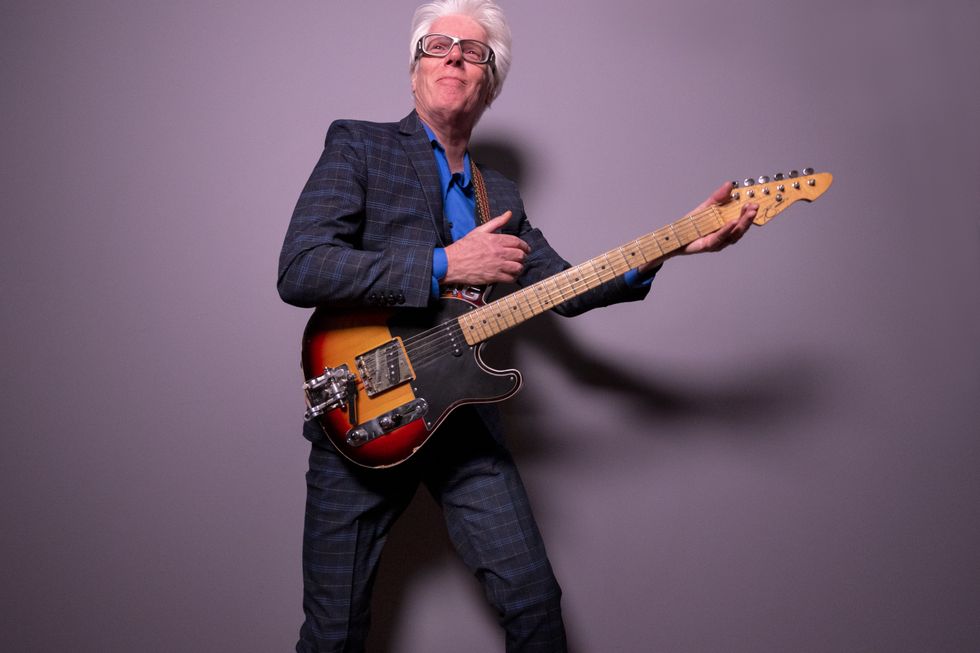
Lifelong DIYer Rich Gilbert sold most of his home studio gear last year, but with just a couple key pieces, he can still cut album-ready tracks from his new casa in Italy.
Photo by Liz Linder
Home studio whiz Rich Gilbert sold off most of his recording toys when he moved from Maine to Italy in late 2023, but he’s cool with it. All he needs these days is a good laptop with Logic Pro, an interface, and some half-decent nearfield speakers to get comfy with. He records most of his guitars direct these days, and writes and programs his own drums in EZdrummer.
Gilbert has been playing in rock bands since the late ’70s, including Boston art-punks Human Sexual Response and the Zulus, Frank Black and the Catholics, and Eileen Rose (whom Gilbert married). He always loved recording, and soaked in everything he could learn when his bands were in the studio, even if it meant pestering the engineer a little. When Pro Tools became affordable in the early 2000s, he loaded it up with a rackmount interface and MacBook Pro. He devoured issues of Tape Op magazine and started building up his collection of microphones and plugins. He still doesn’t call himself a pro, but that’s part of the point. “This whole digital recording revolution is fantastic in that it enables people like me to make good-sounding records,” he says. “At the same time, it’s kind of a cheat because I don’t really have to know as much.” Over the past 20 years, Gilbert has home-recorded LPs for his solo project, Eileen Rose, and his old band, the Zulus. He also has a practice of cutting tracks for indie artists—for one example, St. Augustine, Florida’s Delta Haints—at $75 per song.
Rich Gilbert's Home Studio Gear
Guitars
- Peavey Omniac JD
- Amps
- Line 6 POD Farm
Effects
- Slate Digital plugins
Interface, Mics, and Monitors
- Pro Tools
- Mackie HR824
- Line 6 POD Studio UX2
- Shure SM7
- Shure SM57
- Shure SM58
- Audio-Technica AT2020
- Audio-Technica AT2035
- Blue Spark
- Monster Power PowerCenter PRO 3500
Gilbert says any aspiring at-home engineer ought to go right to the source for solid information. Study how other engineers have recorded things through history. If there’s a particular sound or feel you’re going for, look at the equipment used to capture it. These days, chances are good that basically any piece of gear you’d lust after has been turned into a plugin.
“Read as much as you can,” says Gilbert. “Read interviews with other engineers as much as you can, ’cause you’ll learn.” In Gilbert’s decades of reading and research, he says he’s seen one sentiment crop up again and again: There is no right or wrong way to do it. “All these things we do are just techniques that someone else did, and then passed it on to someone else,” says Gilbert.
That ethos, he explains, actually comes right from the 1960s and ’70s golden recording era that most of us are trying to ape. “They were really experimenting with unorthodox recording techniques to get previously unheard sounds onto records, and you can still incorporate that philosophy into digital recording,” says Gilbert. “Don’t be afraid to experiment. If it sounds good, it is good.”
That said, another important piece is to know when to walk away from a session. If every frequency seems to be just out of whack with your ears, there’s a good chance you need a break. Remember: At home, you’re juggling the jobs of guitarist, engineer, and producer, and sometimes, the producer has to tell the guitarist to take a walk and come back with a fresh perspective.
James Goodson

James Goodson launched his home-recording project Dazy as an outlet for his “demoitis,” and his song “Pressure Cooker” exploded into an alt-classic.
Photo by Chris Carreon
James Goodson never meant for his band Dazy to be a home-recording project, but after years of tinkering in GarageBand, he’d gotten attached to the rawness of the demos he made with drum machines. During the great shutdown of 2020, he decided to release them into the wild. Now, his single “Pressure Cooker,” a collab with the punks in Militarie Gun, has racked up more than 500,000 streams.
Goodson says he’s not a technical person, so he tries to keep it simple and trust his ears. “If something sounds cool, then that’s that,” he says. “I’m not worried about ‘the right way’ to arrive there.” After almost 20 years on GarageBand, he recently switched to Logic, into which he runs his 4-channel Behringer interface. He uses two mics—a Shure SM57 for his vocals, and a Sennheiser e 609 for recording guitars. He prefers the 609 for its simplicity: Slap it right flush with the grille and start playing. It’s usually on a Vox AC15C1, but Goodson’s secret weapon is a lineup of battery-powered pocket amps that sound “truly wild” when cranked. This combo is how he achieves most of the lush, varied guitar sounds on Dazy’s recordings, with the odd “weird DI tone” in the mix as well. “There’s something cool about the tones from a real amp colliding with some wack digital tone,” he says.
James Goodson's Home Studio Gear
Guitars
- Fender Vintera ’60s Jazzmaster Modified
- Fender MIJ Telecaster
- Fender Marauder
- Fender Highway One Jazz Bass
- Fender Villager 12-String Acoustic
Amps
- Vox AC15C1
- Fender MD20 Mini Deluxe
- Fender Mini ’57 Twin-Amp
Effects
- Electro-Harmonix Big Muff
- Electro-Harmonix Op Amp Big Muff
- Behringer SF300 Super Fuzz
- Big Knob Pedals I.C.B.M. 1977 Op Amp Muff
- Permanent Electronics Silver Cord Fuzz
- Electro-Harmonix Soul Food
- Boss SD-1
- Seymour Duncan Shape Shifter
- MXR Phase 90
- MXR Micro Chorus
Interface, Mics, and Monitors
- Behringer U-Phoria UMC404HD
- Sennheiser e 609
- Shure SM57
Goodson says his biggest challenge is managing volume levels. Feedback, for example, is difficult to capture unless you push an amp to its limits, which generally involves a lot of noise. Space is limited at Goodson’s house, so he’s generally in close quarters with that squall for extended periods of time. “Thankfully, my wife is incredibly patient about the racket,” he says, “but I’m not sure if my ears are as flexible.”
“There’s something cool about the tones from a real amp colliding with some wack digital tone.” - James Goodson
Those downsides do have proportionate offsets, though. Goodson says the creative process that one can chase at home is incomparable to its studio counterpart. This ultimately comes down to time and money. “I love being able to just sit around for hours rearranging pedals in search of the ugliest fuzz or playing a part over and over trying to make the screechiest noise—the kind of thing that no one is gonna want to put up with when you have two days in a studio to record ten songs,” he says.
Pushing the boundaries of good taste is one of the sweet joys of life, but Goodson says it's important to know your limits, too. When recording at home, it’s critical to know when to tag in help, he says, and he always sends off his tracks to be mixed by a professional engineer.
The Wrap-UP
There’s a lot of technical overlap between how Feingold, Gilbert, and Goodson work, but the crucial thing they all have in common is reverence and excitement for whatever they’re playing on. Recording guitar from home works best if you really, deeply care about the sounds that you’re creating—even if they’re not for your own projects. Getting the best possible result out of your stay-at-home studio is a matter of experimentation, patience, and genuine respect for the music. You don’t have to drop big money to get those things, but you do have to practice at them. If you ever get frustrated with the process, just remember: Being a work-from-home guitarist is a pretty sweet gig.